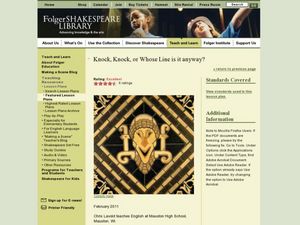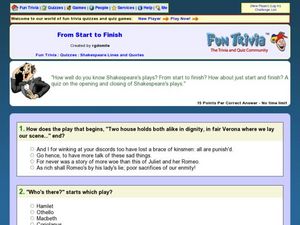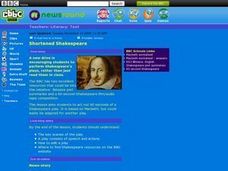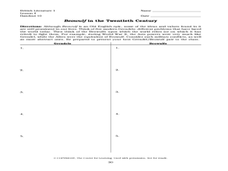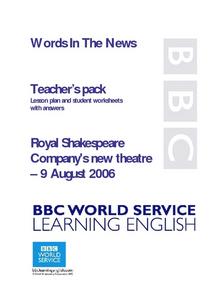Curated OER
Julius Caesar: iambic pentameter
Read in iambic pentameter! Read Julius Caesar and Macbeth to study the famous meter. While the lesson points out the specific passages to use, you'll have to find them and copy them yourself.
Curated OER
And. . . Freeze!
Learners read a short section of a scene very closely and develop a tableaux as a start to the performance process. They write a paragraph in the voice of a character. They present their beginning, middle and end tableaux to the class.
Curated OER
This Was the Noblest Roman of Them All
High schoolers analyze the problems with staging and character using the play Julius Caesar. They summarize the final scene of the play and view film versions of the scene. Additionally, they prepare a promptbook for the final scene and...
Curated OER
Knock, Knock, or Whose Line is it Anyway?
Students compare two versions of Macbeth and participate in improvisational acting. In this improvisational lesson, students read and discuss the text before watching two different versions of the film. Students roleplay a scenario and...
Curated OER
Performing Modernized Shakespeare
Students select a piece of text from a play and prepare it for performance to the class based on their modern setting.
Curated OER
Looking at Life through the Creation of Personal Metaphors
Young scholars focus on the creation of personal metaphors, which are first illustrated in pictures and caricatures and then extended to descriptive/analytical paragraphs. They teach the lesson to others using their own personal...
Curated OER
From Start to Finish: Shakespeare's Plays
This online interactive quiz is too low-quality to assign to your class; however, you may want to adapt the idea of recognizing starts and finishes of works for your own lesson or quiz. An example from the worksheet is: "When shall we...
Curated OER
Shortened Shakespeare
Young scholars discover the two main ingredients of a play: speech and actions. They then listen to a shortened version of "Macbeth" and write down one sentence to describe what is happening in each of the comic-strip cells.
Curated OER
An Actor's View of Shakespeare
Students research characters from different plays. In this Shakespeare and performing arts lesson, students discuss the portrayal of characters from the perspective of real actors. Students work in groups to examine the technique for...
Curated OER
The Concept of the Hero
Students explore the symbolic implications for the concept of the hero with a focus on the Beowulf theme. In this hero concept lesson, students find specific examples of monsters from Beowulf to complete the chart. Students list the...
Curated OER
HAMLET HOOK
Students their personal reactions to issues of family relationships in light of the the plot, characterization, and themes of the play. They analyze the characters of Hamlet on an emotional level not just intellectual.
Curated OER
Creating a Classic Comic Book
Students read a given play. They choose the key scenes from the play and write a narration to carry the plot line between those scenes. They create a comic book that depicts these key scenes, complete with pictures and text balloons.
Curated OER
What's in a Name? Considering the Shakespeare Authorship Question
Did Shakespeare really write all that stuff? After viewing a trailer for the film, Anonymous and reading Stephen Marche’s article “Wouldn’t It Be Cool If Shakespeare Wasn’t Shakespeare?” class groups read articles about the Shakespeare...
Curated OER
Royal Shakespeare Company's New Theatre
Students brainstorm the names of Shakespeare's plays and read an article about a new theatre. They complete worksheets about the plays. In groups, they play a game where they give clues about films or plays and others try to guess the...
Curated OER
The Play's the Thing
Students study the life and works of William Shakespeare. They investigate the art of playwriting and write a play of their own.
Curated OER
Othello's Predecessors: Moors in Renaissance Popular Literature
Young scholars gather textual citations from Othello, discuss stereotypes that they hold, examine primary source materials, and write character profiles.
Curated OER
Othello's Father of the Bride
Students read and analyze Act one of the play Othello. They examine the themes of love and marriage and interpret Brabantio's words by using different subtexts.
Curated OER
"O, I have lost my reputation" - Why Reputation Matters in Othello
Students examine Othello's references to and attitudes toward reputation.
Curated OER
Scatterbrained Soliloquies
Students reconstruct a famous soliloquy from Romeo and Juliet which the teacher has cut apart and scattered. They piece the soliloquy back together making sense of the passage.
Curated OER
The Power of Music
Students analyze the music Shakespeare chose for his play The Tempest. They seek to research why he alluded to popular music and contemporary artists. Students make connections between their own musical knowledge/tastes/interests and the...
Curated OER
Viciousness in "Twelfth Night" and "Lord of the Flies"
Students work in discussion groups to examine the treatment of Malvolio in Shakespeare's "Twelfth Night" by comparing the play to the novel "Lord of the Flies".
TES Global
Tes: Macbeth: Power Players
[Free Registration/Login Required] This is a comprehensive lesson on the Power Players in Shakespeare's Macbeth; it includes a PowerPoint lesson, video clips of the "Battle Scene" and a Macbeth movie trailer, and a variety of activities...
TES Global
Tes: Macbeth by William Shakespeare: The Role of the Witches
[Free Registration/Login Required] This lesson plan focuses on the role of the witches in Shakespeare's Macbeth including background information about the fear of witches in Shakespeare's time, reading excerpts and answering questions to...
Other
Literary Explorer: Macbeth
Literary Explorer features a language arts unit on William Shakespeare's "Macbeth." Includes teaching and learning strategies for this powerful play.





